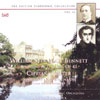Bennett, W S Symphony, Op 43; Potter, C Symphony No 7
A brave rescue act saves us two forgotten 19th-century symphonies
View record and artist detailsRecord and Artist Details
Composer or Director: William Sterndale Bennett, Cipriani Potter
Genre:
Orchestral
Label: Classico
Magazine Review Date: 3/2006
Media Format: CD or Download
Media Runtime: 62
Mastering:
Stereo
Catalogue Number: CLASSCD634

Tracks:
| Composition | Artist Credit |
|---|---|
| Symphony |
William Sterndale Bennett, Composer
Czech Chamber Philharmonic Orchestra Douglas Bostock, Conductor William Sterndale Bennett, Composer |
| Symphony No 7 |
Cipriani Potter, Composer
Cipriani Potter, Composer Czech Chamber Philharmonic Orchestra Douglas Bostock, Conductor |
Author: Andrew Achenbach
Sterndale Bennett’s piano concertos failed to set my pulse my racing when revived a few years back. His G minor Symphony (commissioned by the Philharmonic Society of London in 1863) is a different proposition, though still not without its foibles. When premiered at the Hanover Square Rooms in June 1864, it comprised three linked movements: a genuinely impressive Allegro moderato, full of surging purpose and good ideas (Mendelssohn’s kindly presence is never too far away), a strikingly imaginative minuet and trio (framed, most unusually, by an arresting maestoso introduction and grave intermezzo) and a disappointingly lightweight rondo finale (plundered from an earlier piano study). Rightly sensing that the work required a little more gravitas, the Society directors commissioned the Romanza third movement and the symphony in its definitive guise was first performed in July 1867.
It enjoyed some measure of success up to the First World War, after which it disappeared from view. It’s a very likeable score and one certainly worthy of resuscitation; but that finale remains a stumbling block and the symphony as a whole frustratingly fails to add up to the sum of its (often extremely appealing) parts. Incidentally, Classico’s presentation is confusing: six sections are listed, five of which are allotted a track number – the actual disc contains four!
Sterndale Bennett’s teacher at the Royal Academy of Music, Cipriani Potter (1792-1871), left us nine symphonies in all. No 7 in F major dates from 1826 and this world premiere recording may well be only its second-ever performance. In addition to the occasional distant echo of Schubert, the work has a certain sturdy naivety and vitality that are endearing. It can also boast one or two cheeky harmonic side-steps as well as some felicitous touches of scoring (lovely woodwind colours in the third movement’s trio section especially) but truly memorable invention is in short supply. All the same, a diverting discovery, especially when so sympathetically realised as here.
Indeed, Douglas Bostock conducts both these rarities to the manner born and the Czech Chamber PO’s affectionate playing has been realistically captured by the Classico microphones.
It enjoyed some measure of success up to the First World War, after which it disappeared from view. It’s a very likeable score and one certainly worthy of resuscitation; but that finale remains a stumbling block and the symphony as a whole frustratingly fails to add up to the sum of its (often extremely appealing) parts. Incidentally, Classico’s presentation is confusing: six sections are listed, five of which are allotted a track number – the actual disc contains four!
Sterndale Bennett’s teacher at the Royal Academy of Music, Cipriani Potter (1792-1871), left us nine symphonies in all. No 7 in F major dates from 1826 and this world premiere recording may well be only its second-ever performance. In addition to the occasional distant echo of Schubert, the work has a certain sturdy naivety and vitality that are endearing. It can also boast one or two cheeky harmonic side-steps as well as some felicitous touches of scoring (lovely woodwind colours in the third movement’s trio section especially) but truly memorable invention is in short supply. All the same, a diverting discovery, especially when so sympathetically realised as here.
Indeed, Douglas Bostock conducts both these rarities to the manner born and the Czech Chamber PO’s affectionate playing has been realistically captured by the Classico microphones.
Discover the world's largest classical music catalogue with Presto Music.

Gramophone Digital Club
- Digital Edition
- Digital Archive
- Reviews Database
- Full website access
From £8.75 / month
Subscribe
Gramophone Full Club
- Print Edition
- Digital Edition
- Digital Archive
- Reviews Database
- Full website access
From £11.00 / month
Subscribe
If you are a library, university or other organisation that would be interested in an institutional subscription to Gramophone please click here for further information.




